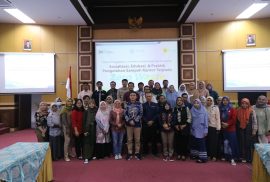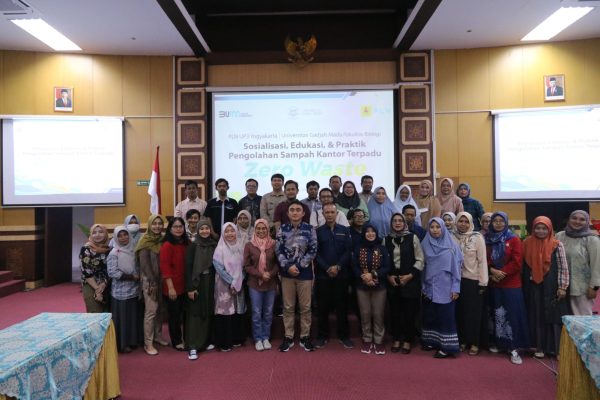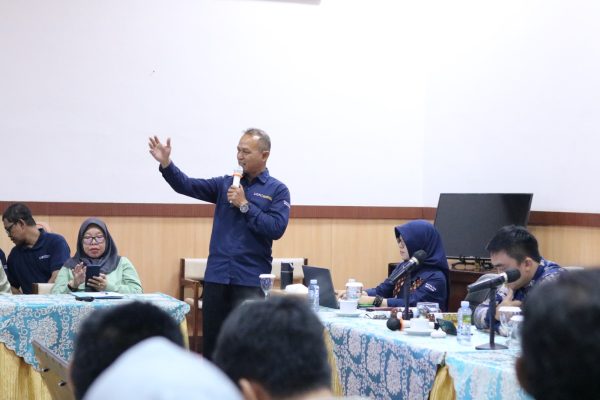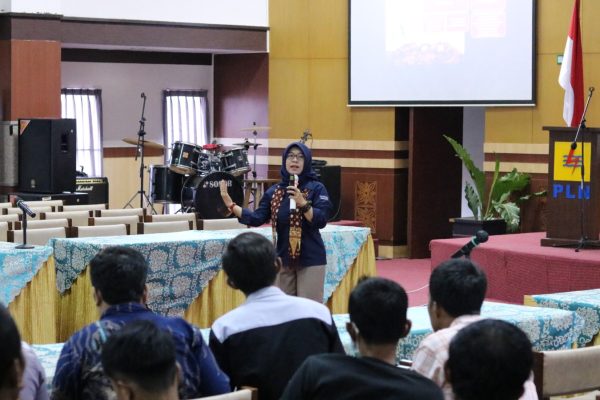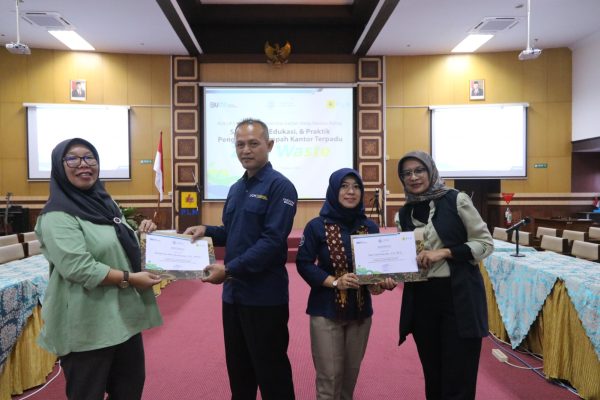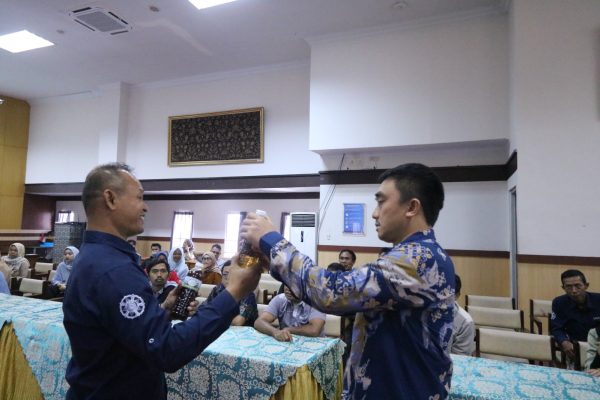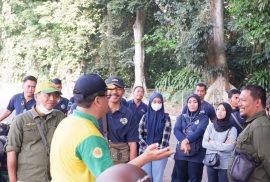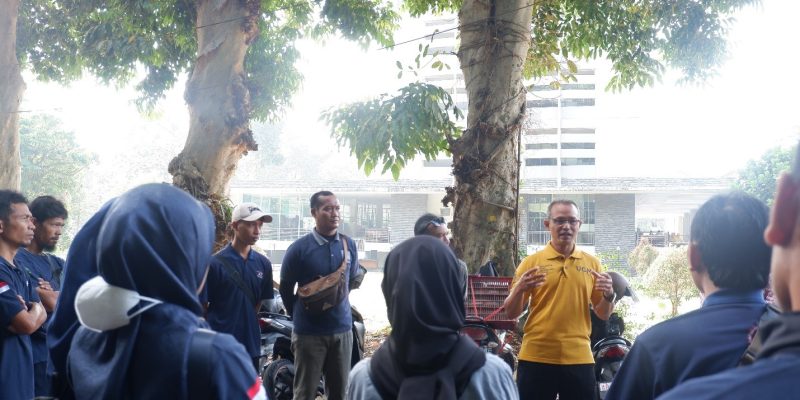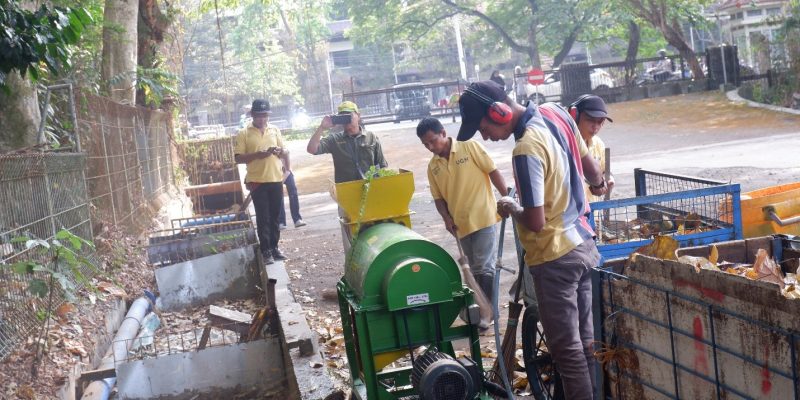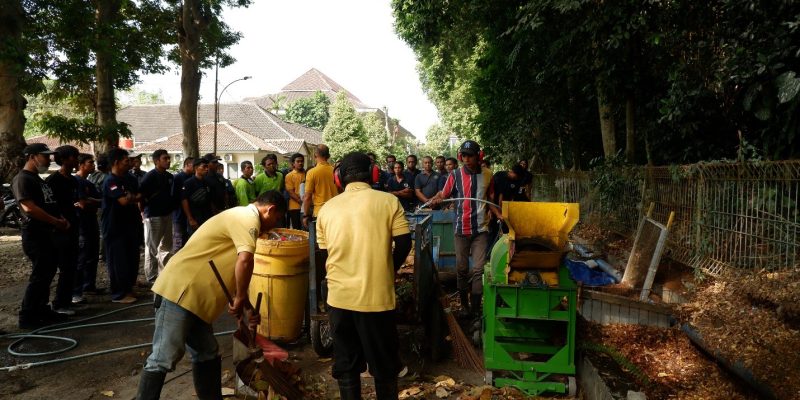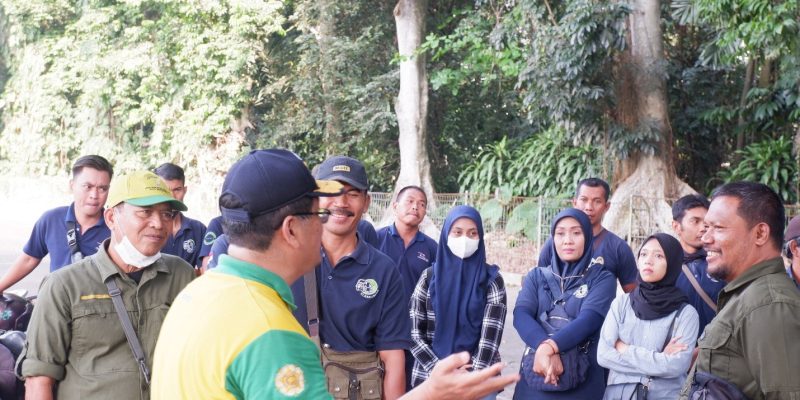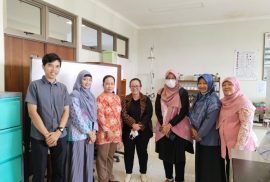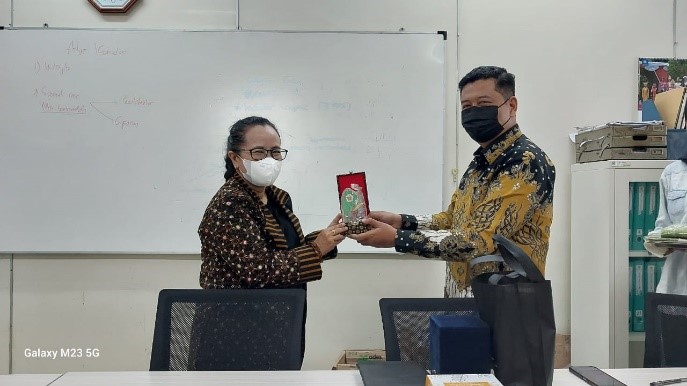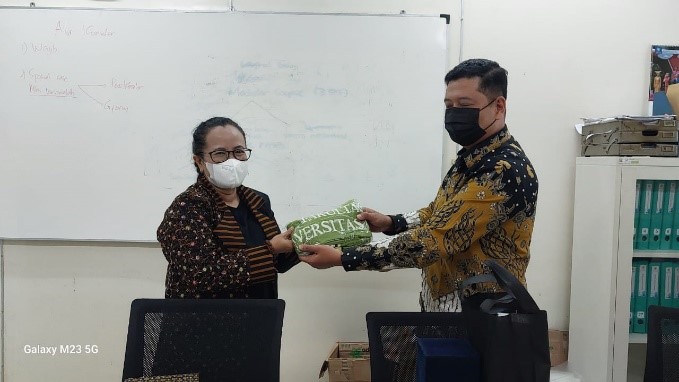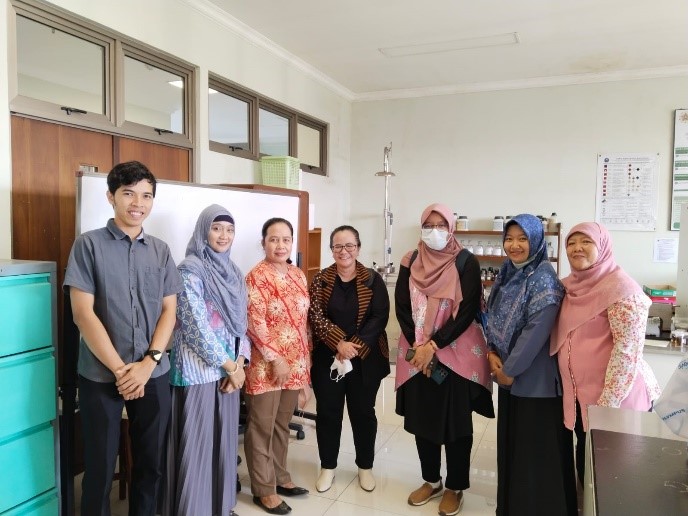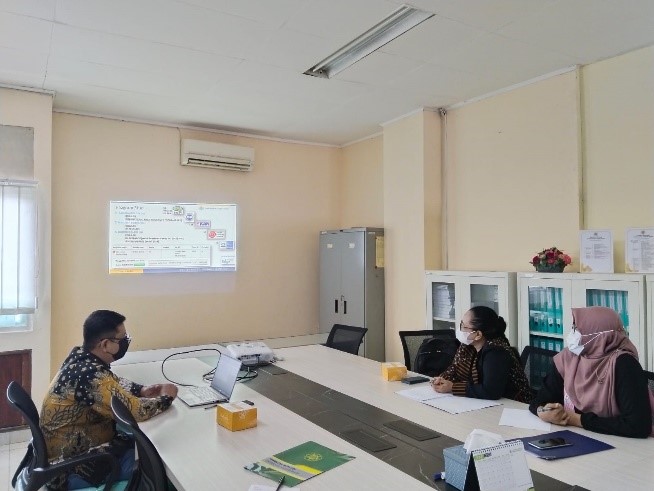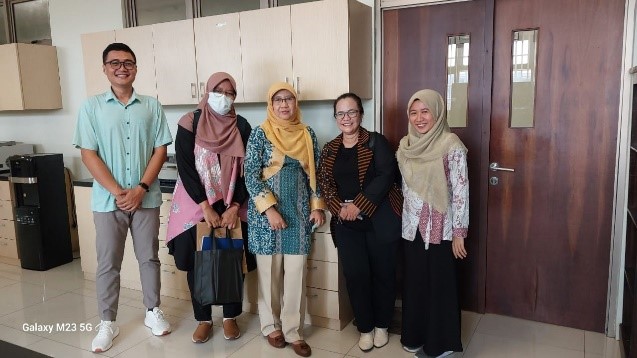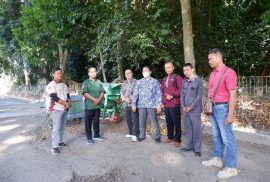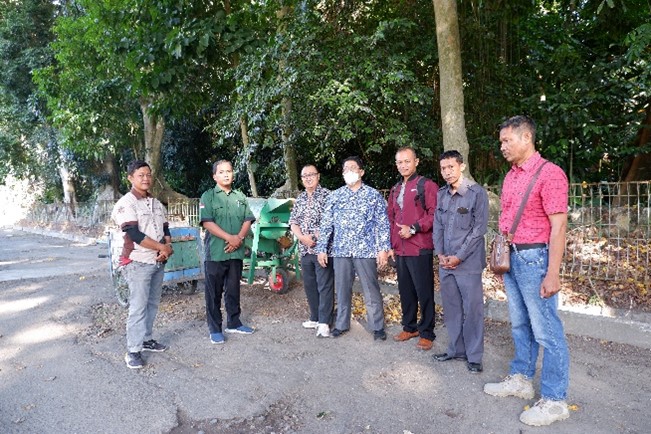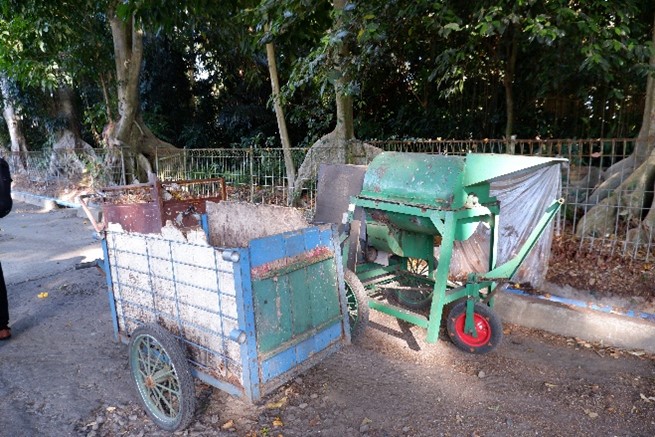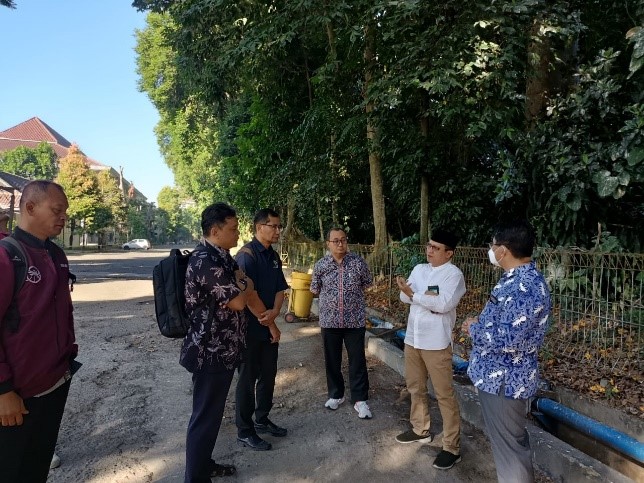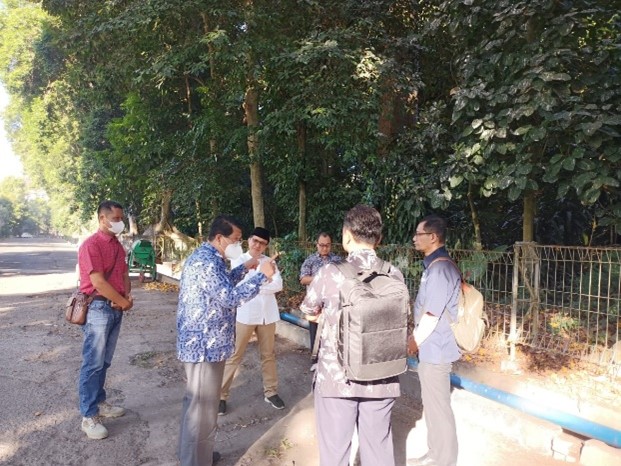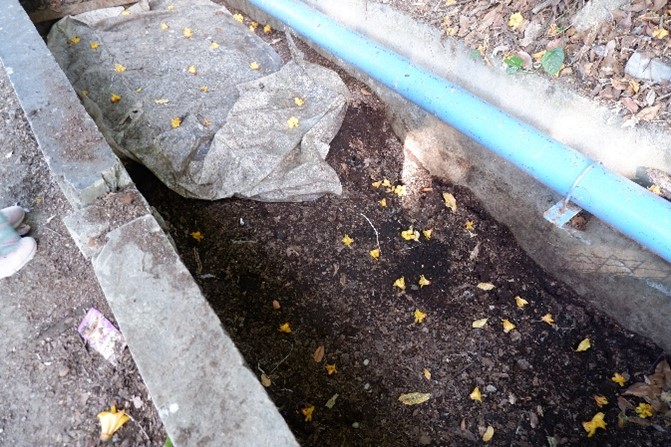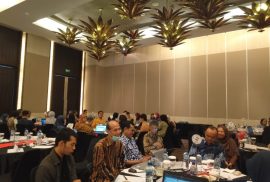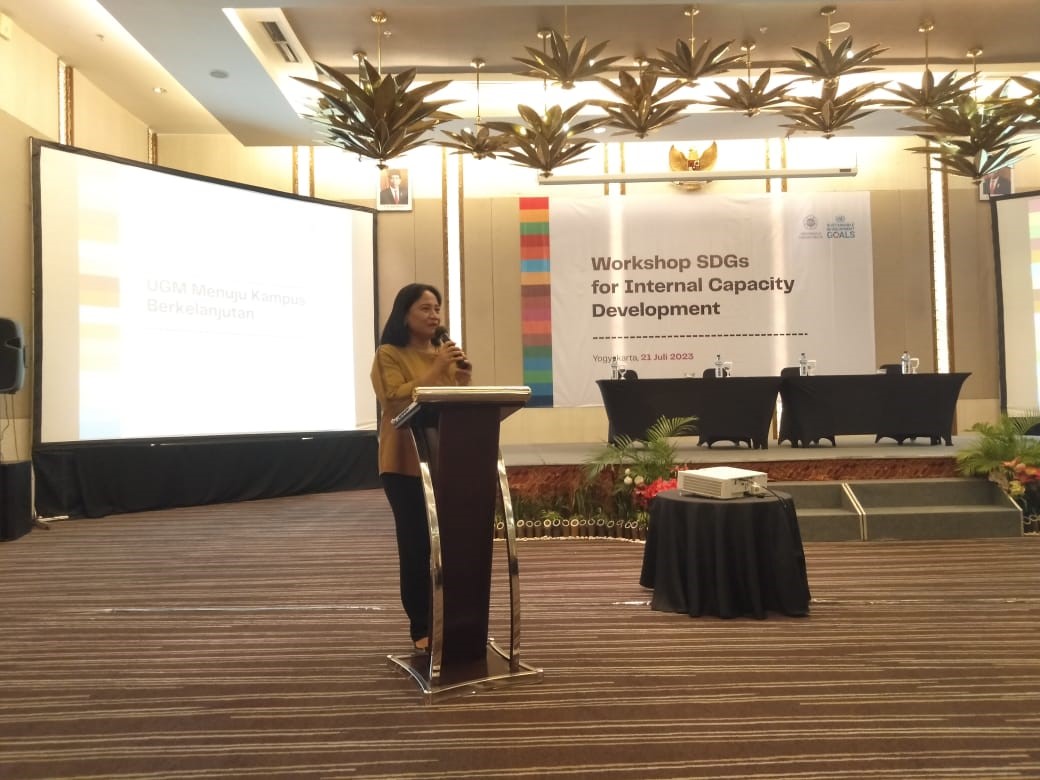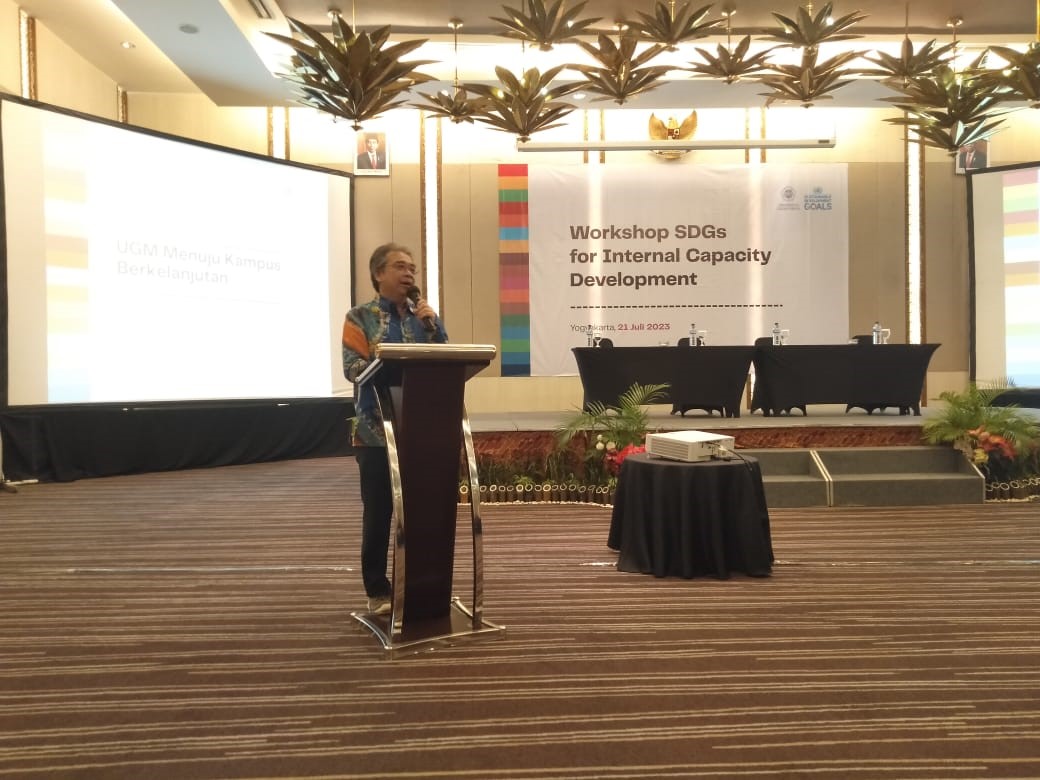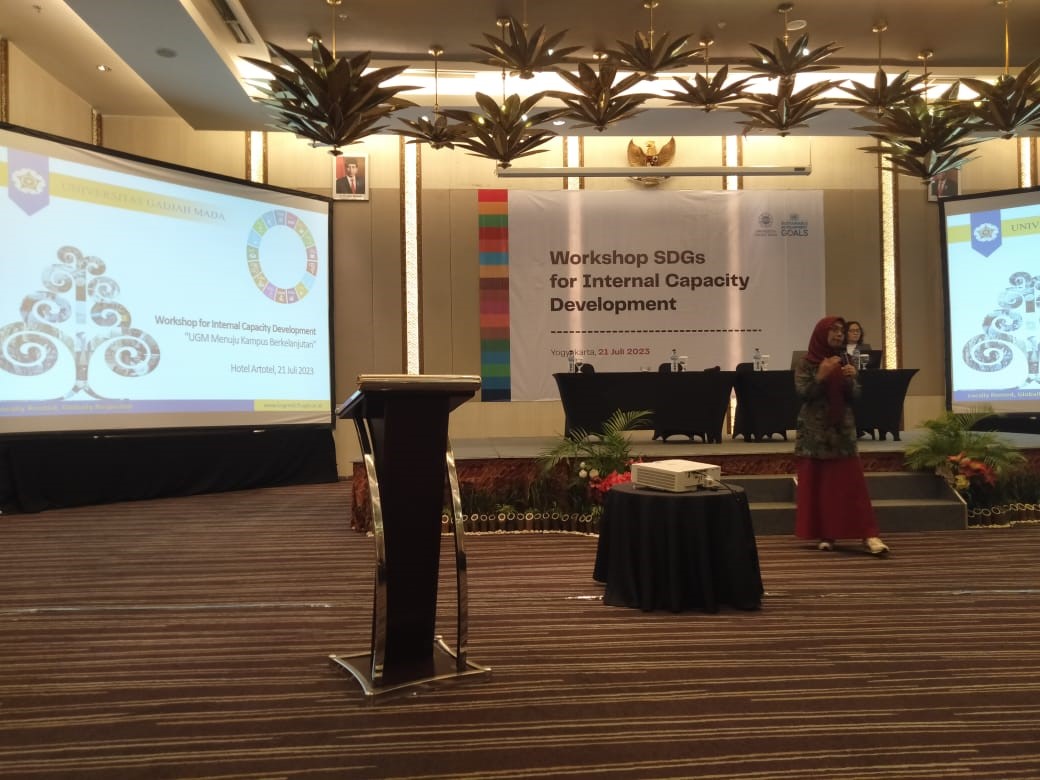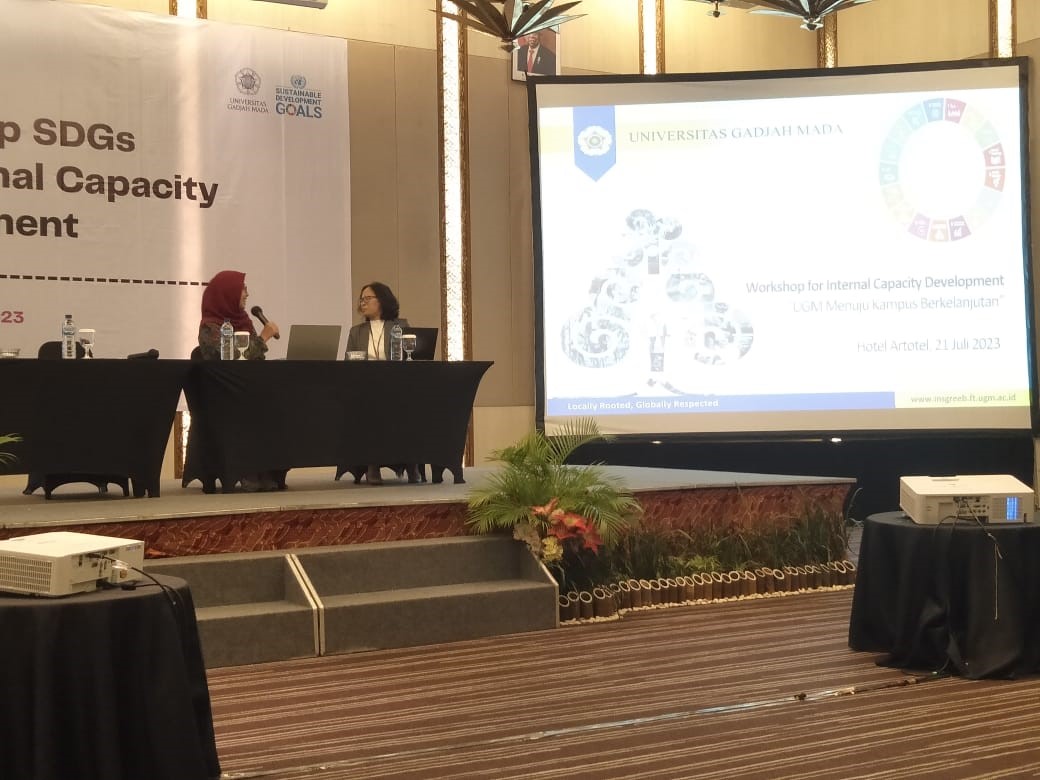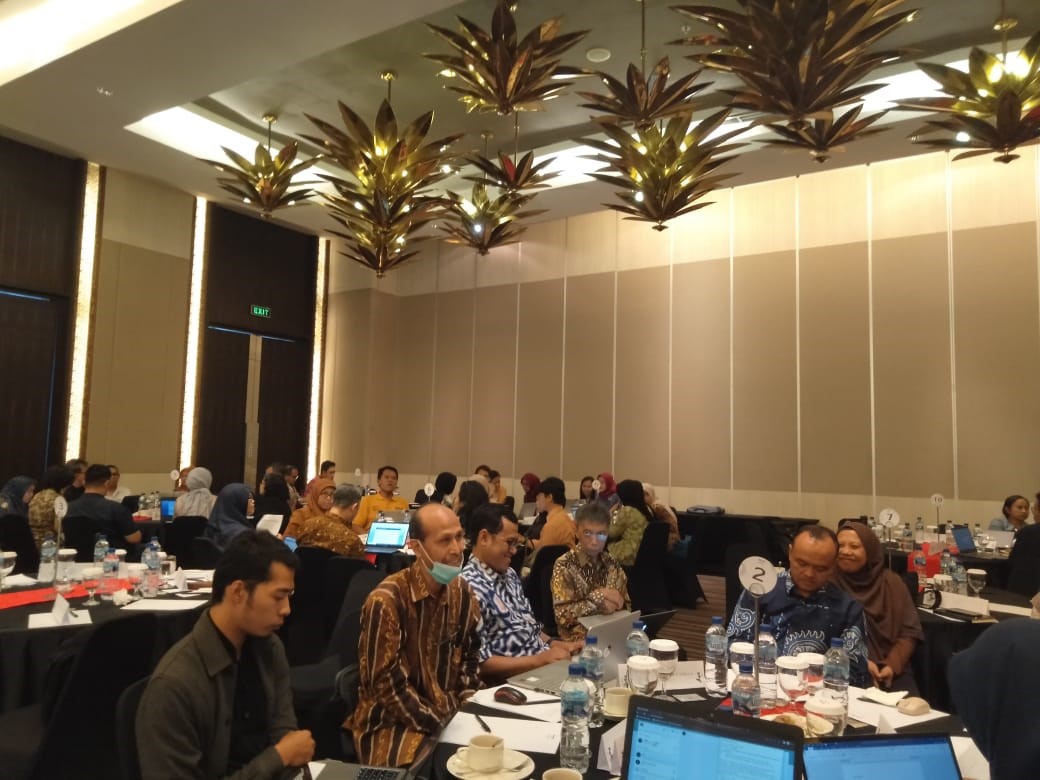SDG 17 : Build Partnerships for the Goals
Yogyakarta, 25 August 2023 – The Organic Waste Management Training was again held by the Faculty of Biology. On this occasion, 50 participants consisted of groups from the Market Sector Department, Trade and Industry Agency (Disperindag), Special Region of Yogyakarta (DIY) as well as the Faculty of Pharmacy and Academic Hospital of Universitas Gadjah Mada. Disperindag’s participation in this training is related to waste management in 29 markets in DIY after the temporary closure of the Piyungan Final Disposal Site (TPA) months ago. At least 9 tons of waste are generated every day from the entire market which has not been managed properly.
“There needs to be an effort downstream with education and upstream by sorting and selecting the waste that is disposed of,” said the Dean of the Faculty of Biology, Prof. Dr. Budi Setiadi Daryono, M.Agr.Sc., in his speech to the training participants, Friday (25/8). Prof. Budi also said that if people at the household level were disciplined in sorting waste based on its category (organic-inorganic) it would be enough to reduce waste problems.
The Faculty of Biology has held Organic Waste Management Training activities which are attended by at least 25 Hospitals, 17 Islamic Boarding Schools, and 30 Waste Management Communities in DIY. On this occasion, as many as 40 participants from the Trade and Industry Agency, especially the Market Sector Department, attended training in the framework of solving waste problems in DIY markets, especially market organic waste in the form of fruit and vegetable waste. The training took place guided by Soenarwan Hery Poerwanto, S.Si., M.Kes. and Suharjita.
Susilo, Operational Service Manager for the DIY Disperindag People’s Market who also attended the training said that there were at least 29 markets involved and planned to work with the Faculty of Biology in waste management. He stated that the waste collected in each market usually does not only come from traders but also from the surrounding community with the largest amount of waste found in Giwangan Market and Beringharjo Market. Efforts that can be made by the Market Management since the closing of the TPA include limiting the amount of waste that the community disposes of at the market. Susilo also revealed the lack of public education regarding waste sorting and processing.
Faculty of Biology is committed to solving organic waste problems in DIY. In managing waste from DIY markets, Faculty of Biology can collect at least 3 tons of waste every day from these markets and process it. With the waste management technology applied at the Faculty of Biology including vermicomposting and Black Soldier Fly, Eco Enzyme, Bioferlilizer, Eco Lindi and others, the waste degradation process can last at least one week.
The commitment of the Faculty of Biology in waste management which also targets the people and communities in DIY emphasizes their commitment as an environmentally friendly campus and supporting Sustainable Development Goals (SDGs). Support for the SDGs includes increasing a healthier life (SDGs 3), having an impact on the availability of clean water in the environment (SDGs 6), and contributing to tackling climate change due to the impact of greenhouse gas emissions from organic waste piles (SDGs 13).
Tuesday, 8 August 2023, Faculty of Biology UGM received a visit from the Faculty of Science and Technology Universitas Terbuka (UT). The visit was received in the Senate Room of the Faculty of Biology and was attended by Dr. Elizabeth Novi Kusumaningrum, S.Si., M.Sc. as Head of Biology Study Program, Faculty of Science and Technology UT and Heny Kurniawati, S.ST., M.Kes. as a Lecturer in the Faculty of Science and Technology UT. From the Faculty of Biology attended by Sukirno, S.Si., M.Sc., Ph.D. as the Head of the Faculty of Biology’s Undergraduate Study Program.
The visit was aimed as a benchmarking for establishing a Laboratory Center at the Faculty of Science and Technology, Universitas Terbuka. Sukirno, S.Sc., M.Sc., Ph.D as the Head of the Faculty of Biology Undergraduate Study Program welcomed the visit and supported further collaborations. He also explained the profile, history, facilities, and focus of teaching education at the Faculty of Biology UGM. He conveyed collaboration and cooperation that could be initiated in the future with Universitas Terbuka.
Dr. Elizabeth conveyed the profile of the Open University, especially the Faculty of Science and Technology, especially the Biology Study Program, while also conveying her wish for a comparative study regarding plans to establish a Laboratory Center at Universitas Terbuka. Dr. Elizabeth expressed her hope for the potential for collaboration with the Faculty of Biology UGM.
The visit was followed by a tour around the facilities and laboratories at the Faculty of Biology including the Laboratory of Plant Development Structure, Plant Systematics, Plant Physiology, Biological Gardens also visiting organic waste management activities at the Faculty of Biology. During the tour, the delegations received presentation on the facilities and activities that took place in the Laboratory at Faculty of Biology and other supporting facilities for teaching and learning activities.
The meeting is a great opportunity to collaborate with the Faculty of Science and Technology at Universitas Terbuka with the Faculty of Biology UGM and especially in planning to develop an integrated laboratory at Universitas Terbuka.
Faculty of Biology, Universitas Gadjah Mada, responded to the waste emergency situation in Yogyakarta following the closure of the Piyungan Final Disposal Site (TPA), which has been the main landfill for final disposal in the Yogyakarta Province (DIY) area. Based on a circular letter from the Regional Secretariat of the DIY Government, the Piyungan Regional TPA will no longer receive waste services as of July 23, 2023 to September 5, 2023 due to the fact that the amount of waste is full and exceeds capacity. Universitas Gadjah Mada through the Faculty of Biology and the Faculty of Dentistry responded by following up on waste management at UGM internally where the coordination of organic waste management is carried out by the Faculty of Biology while the coordination of inorganic waste management is carried out by the Faculty of Dentistry.
As of Thursday, 27 July 2023, Dean of the Faculty of Biology UGM, Prof. Dr. Budi Setiadi Daryono, M.Agr.Sc., has coordinated with the Chancellor of Universitas Gadjah Mada, Prof. dr. Ova Emilia, M.Med.Ed., Sp.OG(K)., Ph.D., and Director of DPKM (Directorate of Community Service) Universitas Gadjah Mada, Dr. dr. Rustamaji, M. Kes. It has been agreed that the Faculty of Biology will manage internal organic waste from Universitas Gadjah Mada in the form of leaf and twig litter. The collection of organic waste will be coordinated at each unit point in all UGM areas to be enumerated first and then sent and managed by the Faculty of Biology to become organic compost. Meanwhile, organic waste in the form of food scraps, fruit and vegetables will be managed by the UGM Argotechnology Innovation Center (PIAT).
The management of leaf litter and twigs in the Faculty of Biology has been going on for a long time in the Biology Garden Area, Faculty of Biology. The chopped organic waste will be processed into compost and then supplied to consumers in collaboration with PT. Pagilaran. The establishment of the Waste Management Center as a response to the closure of the Piyungan TPA will then be coordinated with Soenarwan Heri Purwanto, S.Si., M.Kes. and the waste management team from the Faculty of Biology.
This waste management initiative is a form of commitment from the Faculty of Biology UGM to contribute to the sustainability environment, especially in UGM’s internal environment. It is hoped that this management program will be useful in the long-term settlement of internal waste at UGM in particular and in the Special Region of Yogyakarta (DIY) in general.
Friday, July 21st 2023, Universitas Gadjah Mada held a Workshop on SDGs for Internal Capacity Development: UGM Towards a Sustainable Campus at the Lotus Ballroom, Artotel Suites Bianti, Yogyakarta. The event was attended by representatives from various UGM working units including from Faculty of Biology represented by Mukhlis Jamal Musa Holle, S.Sc., M.Env.Sc., D.Phil. The event began with remarks by the Vice Chancellor for Education and Teaching Universitas Gadjah Mada, Prof. Dr. Wening Udasmoro, S.S., M. Hum., DEA. Prof. Wening explained the importance of the contribution of universities and their academic community in realizing the SDGs (Sustainable Development Goals) which have been promoted by the United Nations since 2015. Anticipation needs to be done to ensure that life in the future will avoid crises including the food crisis, extreme climate change and so on. UGM in the management of the SDGs is also got 2nd ranked in Indonesia and will continue to be developed. Prof. Wening also explained the importance of active data collection and publication to media so that activities carried out at UGM can be exposed to the wider community.
Further remarks were given by the Head of Quality and Reputation Assurance of Universitas Gadjah Mada, Dr. L. Hartanto Nugroho. He explained that contributions for SDGs can be made in small ways and small changes can have a big impact. A simple example in terms of segregating waste in a university environment, it must be carried out systematically and massively and involve all components and the academic community at the university.
The workshop continued with a general presentation by Prof. Dr. Puji Astuti, S.Si., M.Sc., Apt. and Ir. Sentagi Sesotya Utami, St., M.Sc., Ph.D. They explained that the most important aspects of the 17 SDGs are the environment and human sustainability. University ranking in terms of SDGs is not the main thing to achieve, but the ranking is a form of measurement for achievements or activities that have been carried out. UGM also supports sustainability in university governance from the aspects of ecosystems and the environment as well as human sustainability. This can be seen in the policies and regulations issued by UGM. The principles of sustainability or campus sustainability applied at UGM include energy conservation, waste management, water conservation, and eco-friendly transportation. In addition, the achievements of the activities carried out need to be balanced with massive publications so that they can be heard outside the university.
The workshop continued with Forum Group Discussions (FGDs) where participants were divided into 4 categories: Medicines, Agro and Life Science, Social Science, and Art and Humanities. Discussions focused on implementing the SDGs in their respective work units, SWOT analysis, plans for follow-up activities and plans for publication of SDGs achievements. In the discussion, representatives of the Faculty of Biology who included in Agro and Life Science category explained what activities had taken place at the Faculty of Biology and presentation ideas regarding the implementation of SDG No. 2 (Zero Hunger) and SDG No. 12 (Responsible Consumption and Production). Some of the components of the discussion include how programs play a role in overcoming food insecurity for the academic community and the general public, interventions for dealing with food insecurity, publication of sustainability reports, waste management, to how each work unit can represent research or activities carried out at the work unit level as part of the SDGs.
The workshop ended with closing and a reminder of how important everyone’s role is in realizing the SDGs, especially at the university level. It is hoped that this activity can be a trigger for the implementation of the SDGs and better publications at Universitas Gadjah Mada.

